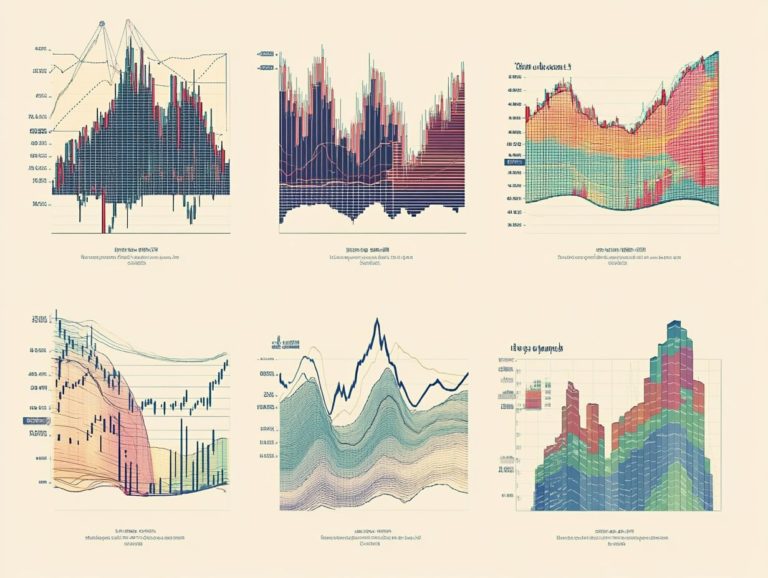7 Trading Strategies for Emerging Markets
Investing in emerging markets can be an exhilarating venture, brimming with both opportunities and challenges. As these regions evolve, mastering the art of navigating their unique landscapes becomes essential for your success.
This article unveils seven vital trading strategies specifically tailored for emerging markets. From portfolio diversification to staying attuned to local economic conditions, each strategy offers valuable insights. It addresses the associated risks, highlights common pitfalls to avoid, and outlines ways to stay ahead in this dynamic arena.
Whether you re a seasoned investor or just beginning your journey, these insights will empower you to make informed decisions on your investment path.
Contents
- Key Takeaways:
- 1. Diversify Your Portfolio
- 2. Stay Informed About the Country’s Economic and Political Climate
- 3. Consider Currency Fluctuations
- 4. Pay Attention to Liquidity Risks
- 5. Understand the Cultural Differences and Business Practices
- 6. Monitor Emerging Market Indexes
- 7. Use Technical Analysis
- What Are Emerging Markets and Why Are They Attractive to Investors?
- What Are the Risks Involved in Investing in Emerging Markets?
- Unlocking Success: Trading Strategies for Emerging Markets?
- How Can Investors Mitigate Risks When Trading in Emerging Markets?
- What Are Some Common Mistakes to Avoid When Trading in Emerging Markets?
- How Can Investors Stay Ahead of the Curve in Emerging Markets?
- Frequently Asked Questions
- What are the 7 trading strategies for emerging markets?
- Why is diversification important in trading emerging markets?
- What is the benefit of long-term investing in emerging markets?
- How does currency hedging work in trading emerging markets?
- What is stock picking in the context of trading emerging markets?
- What is market timing and how can it be applied to trading emerging markets?
- Why is risk management important in trading emerging markets?
Key Takeaways:

- Diversify your portfolio to mitigate risks in emerging markets.
- Stay informed about the country’s economic and political climate before investing.
- Consider currency fluctuations; they can greatly impact your returns.
1. Diversify Your Portfolio
Diversifying your portfolio is crucial for effectively managing risk in financial markets. This strategy can supercharge your trading strategies, giving you a competitive edge!
A well-structured trading plan that incorporates a variety of asset classes serves as a buffer against market volatility. It improves the profit potential of your investments.
By including stocks, bonds, commodities, and real estate in your mix, you create a safety net that softens the blow during downturns in any single sector. When equity markets stumble, bonds can provide stability; likewise, commodities might thrive during inflationary periods.
This diversity mitigates risk and expands your trading horizons. Leveraging platforms that offer seamless access to various asset classes makes implementation easy. Whether you opt for a multi-asset brokerage account or advanced trading software, you can adjust your strategies to seize market shifts while maintaining a balanced approach.
2. Stay Informed About the Country’s Economic and Political Climate
Staying informed about the economic and political climate of a country is essential for you as a trader. These factors significantly impact financial markets and your trading decisions.
Economic indicators, such as Gross Domestic Product (GDP) growth and employment rates, act as crucial barometers for market performance. They shape expectations and influence investor sentiment. For example, a robust increase in GDP often breeds optimism among traders, possibly driving stock prices upward. Conversely, rising unemployment may signal economic distress, prompting a more cautious trading approach.
The timing of political events, like elections or major policy changes, can introduce volatility into the market. A new administration might usher in regulatory shifts affecting entire sectors. To navigate these complexities, consider using financial news aggregators or economic calendars. These resources keep you updated on relevant developments, enabling you to adapt your strategies effectively.
3. Consider Currency Fluctuations
Currency fluctuations are essential in financial markets, significantly influencing trading strategies and overall market volatility. You must grasp how these changes affect asset prices and integrate effective risk management techniques into your trading plan.
By analyzing currency pairs, you uncover insights into broader economic conditions and identify profit opportunities. The importance of technical analysis in this realm cannot be overstated; it provides the tools necessary to predict potential currency movements.
Employing various trading indicators helps you recognize prevailing trends and evaluate support and resistance levels, which are vital for making well-informed decisions. As you interpret price charts and signals, you ll find yourself better equipped to navigate the complexities of currency trading, ultimately boosting your performance in this competitive landscape.
In conclusion, understanding these strategies will equip you with the tools needed to thrive in emerging markets. Diversification, staying informed, and monitoring currency fluctuations are key steps to making informed investment decisions. Embrace these strategies to enhance your investment journey!
4. Pay Attention to Liquidity Risks
Pay attention to liquidity risks, as they are crucial for you as a trader. Insufficient liquidity can negatively impact your trading capital and make it hard to execute your strategies. By understanding liquidity in various market conditions, you can enhance your trading performance and sidestep the pitfalls that often accompany market volatility.
In highly liquid markets, like major currency pairs or large-cap stocks, you can enter and exit positions swiftly without significantly affecting prices. This fluidity ensures smoother execution of stop-loss orders, allowing your risk management strategies to stay intact.
On the flip side, in illiquid markets such as certain small-cap stocks or niche commodities your trades can trigger substantial price swings, leading to slippage (when the price changes quickly, leading to potential losses) and unexpected losses.
To minimize these liquidity risks, selecting the right trading platform is essential. Reputable platforms typically offer access to deeper order books and better pricing, enabling you to make informed decisions even amidst volatile conditions.
5. Understand the Cultural Differences and Business Practices

Understanding cultural differences and business practices is essential for you as a trader, especially when navigating the intricate world of international financial markets. These elements significantly shape your trading strategies, influence trader psychology, and dictate your overall approach to market dynamics, ultimately determining your trading performance and decision-making.
By recognizing these cultural nuances, you can skillfully maneuver through diverse market environments. For instance, if you’re trading in Asian markets, you’ll need to be attuned to hierarchical structures and methods that emphasize group consensus. Conversely, in Western markets, the focus often shifts toward individual decision-making and swift execution.
Adapting your strategies to align with these local conditions isn t merely advantageous it can be the key to successful deals. Embracing cultural insights fosters stronger relationships and trust with local partners, enhancing your business prospects and giving you a competitive edge in the global arena.
6. Monitor Emerging Market Indexes
Monitoring emerging market indexes is crucial for spotting exciting new trading opportunities, as these markets often showcase unique trends and volatility that can translate into significant profit potential. By analyzing these indexes, you can refine your trading strategies and make informed decisions based on the latest market signals.
The importance of these markets cannot be overstated; they frequently reveal untapped sectors ripe for investment and offer opportunities for risk diversification. Key indexes to pay close attention to include:
- MSCI Emerging Markets Index
- FTSE Emerging Index
These serve as benchmarks for evaluating the performance of dynamic markets. A thorough examination of economic indicators, geopolitical developments, and technological advancements provides valuable insights into market movements. By staying attuned to these factors, you can uncover innovative trading strategies tailored to the unique behaviors of emerging economies, ultimately enhancing your overall portfolio resilience.
7. Use Technical Analysis
Technical analysis is a must for traders who want to understand price movements and spot trading patterns in financial markets. By using trading indicators, you can improve your ability to predict market shifts and make informed decisions that fit your trading plan.
One effective technique is Fibonacci retracement levels, which help you identify potential support and resistance areas. These levels indicate where price corrections might occur after significant moves.
Bollinger Bands provide insights into market volatility. They highlight periods when the market might be gearing up for breakouts or reversals.
Mastering these indicators takes practice. Use demo accounts and backtesting strategies methods for testing your trading strategies on past data to hone your skills without any financial risk.
This iterative process builds your confidence and helps you develop personalized approaches tailored to your unique trading style.
What Are Emerging Markets and Why Are They Attractive to Investors?
Emerging markets are your ticket to rapidly growing and industrializing economies. They are incredibly appealing if you’re seeking high returns and unique trading opportunities.
In these markets, significant shifts in conditions create a compelling landscape for strategic trading across various financial instruments. These regions boast robust economic growth potential, with increased consumer demand and expanding middle classes drawing investor interest.
For instance, India and Brazil embody vibrant emerging markets that promise substantial growth but also present challenges like high volatility and evolving regulations.
As a trader, you re naturally drawn to these markets, eager to capitalize on the significant price swings that can lead to impressive returns. With ongoing development, the dance between risk and reward creates a dynamic environment perfect for exploring diverse investment strategies.
What Are the Risks Involved in Investing in Emerging Markets?
Investing in emerging markets comes with notable risks, including volatility and unpredictable market dynamics, which can significantly influence your trading strategies. It’s crucial to understand these risks to harness high return potential while managing your investments wisely.
Key challenges include political instability and a lack of liquidity, which can lead to sudden price swings. Be ready for fluctuations stemming from unexpected geopolitical events or shifts in regulations.
To navigate these turbulent waters, consider diversifying across various sectors and regions. This approach helps spread your exposure and mitigate risks.
Additionally, employing stop-loss orders acts as a protective measure, automatically triggering sales when assets dip below a certain price and limiting potential losses.
By implementing these strategies, you can safeguard your portfolio while pursuing growth opportunities in these dynamic markets.
Unlocking Success: Trading Strategies for Emerging Markets?

You ll find a range of trading strategies crafted specifically for emerging markets. Each strategy is designed to effectively navigate market trends and seize trading opportunities. By familiarizing yourself with these strategies, you can elevate your trading performance and ensure your methods align with current market conditions.
Among the favored options are swing trading and day trading, each boasting its own distinct advantages and challenges. Swing trading offers a more relaxed approach, allowing you to hold positions for several days and capitalize on price movements influenced by market fluctuations.
On the other hand, day trading demands a hands-on technique, with positions typically held for shorter durations sometimes just minutes or hours to exploit rapid price changes.
Choosing the right strategy depends on thorough market analysis and a clear understanding of your personal investment objectives. This enables you to make informed decisions that align with your risk tolerance and the prevailing market conditions.
How Can Investors Mitigate Risks When Trading in Emerging Markets?
You can effectively mitigate risks when trading in emerging markets by implementing robust risk management practices. These practices safeguard your trading capital and ensure you adhere to a well-structured trading plan.
Employing effective strategies like position sizing (which means determining the amount of capital to risk on each trade) and diversification is essential for successfully navigating the inherent uncertainties of these markets.
Utilizing trading indicators like the Relative Strength Index (RSI) and Moving Average Convergence Divergence (MACD) can offer you real-time insights into market conditions. This helps you assess potential risks before making decisions.
Establishing clear entry and exit rules is equally crucial. It minimizes the risk of emotional trading and fosters discipline. By regularly reviewing and adjusting your trading plan based on market changes, you enhance your resilience. This enables you to adapt to volatility without jeopardizing your capital.
These techniques help you navigate the dynamic nature of emerging markets with confidence.
What Are Some Common Mistakes to Avoid When Trading in Emerging Markets?
Common mistakes made by traders in emerging markets often arise from misunderstandings of market dynamics and principles of behavioral finance (the study of how emotions affect financial decisions). This can lead to disappointing trading performance and financial setbacks.
One major pitfall is over-leveraging. This is where you might take on excessive risk in hopes of maximizing your gains, only to grapple with devastating losses. Neglecting fundamental analysis can also cause you to miss valuable opportunities or rush into trades based solely on fleeting market sentiment.
It s crucial to recognize that trader psychology significantly influences decision-making; emotions like fear and greed can easily cloud your judgment. To tackle these challenges head-on, establish and stick to a disciplined trading plan. This helps you maintain focus, ensuring your strategies are based on rational analysis rather than impulsive reactions to market fluctuations.
How Can Investors Stay Ahead of the Curve in Emerging Markets?
To stay ahead in emerging markets, you must engage in proactive market research and continuously adapt your trading strategies to the latest trends. The ability to recognize and act on emerging trading opportunities is essential for achieving sustainable success in your trading endeavors.
Staying informed about market news is critical. Timely updates can reveal potential shifts in trends or highlight significant events that could impact your investment landscape. Utilizing advanced trading platforms for analytics enables you to better interpret market data and make informed decisions.
Networking with other traders not only fosters collaboration but also provides unique insights and perspectives that deepen your understanding of various market dynamics.
Explore trading forums, newsletters, and market analysis tools to stay sharp and ready for action! These resources can further assist you in maintaining a well-rounded view of market conditions, ensuring that you remain agile and responsive amid ever-changing scenarios.
Frequently Asked Questions
What are the 7 trading strategies for emerging markets?

Discover 7 key trading strategies for emerging markets: diversification, long-term investing, currency protection, stock selection, market timing, options trading, and risk management.
Why is diversification important in trading emerging markets?
Diversification spreads risk. Investing in various assets across different industries helps cushion your portfolio from sudden market changes.
What is the benefit of long-term investing in emerging markets?
Long-term investing allows you to weather short-term market ups and downs. This strategy helps you focus on the long-term growth of emerging markets.
How does currency hedging work in trading emerging markets?
Currency protection uses financial tools to shield your investments from currency swings. This is vital in emerging markets where exchange rates fluctuate widely.
What is stock picking in the context of trading emerging markets?
Stock selection means choosing individual stocks based on research and analysis. In emerging markets, it s about finding undervalued or fast-growing companies.
What is market timing and how can it be applied to trading emerging markets?
Market timing is about predicting stock market movements. This approach helps you capitalize on short-term trends or sidestep downturns.
Why is risk management important in trading emerging markets?
Risk management is vital in trading emerging markets due to their unpredictability. It involves strategies like setting stop-loss orders and diversifying your investments to avoid big losses.





